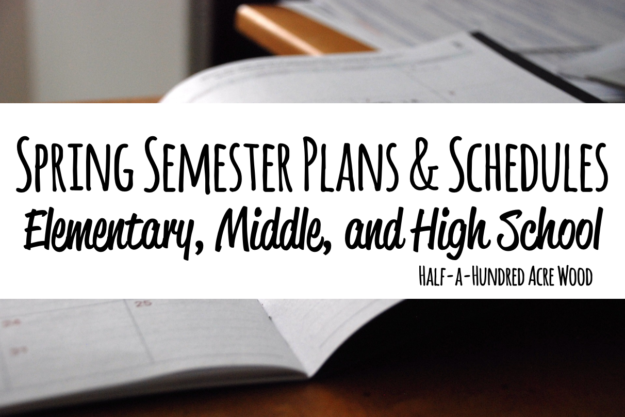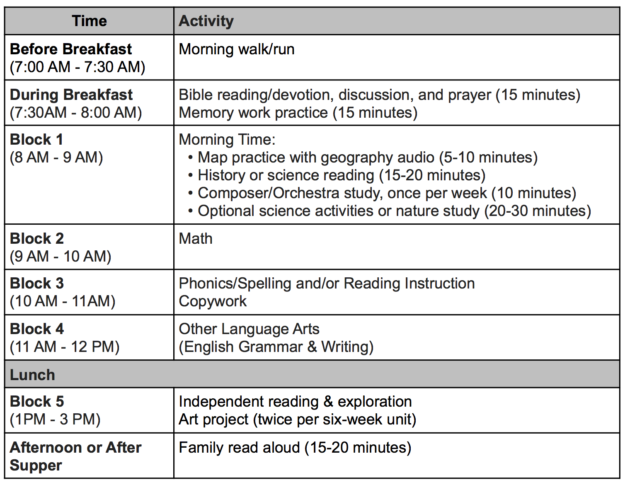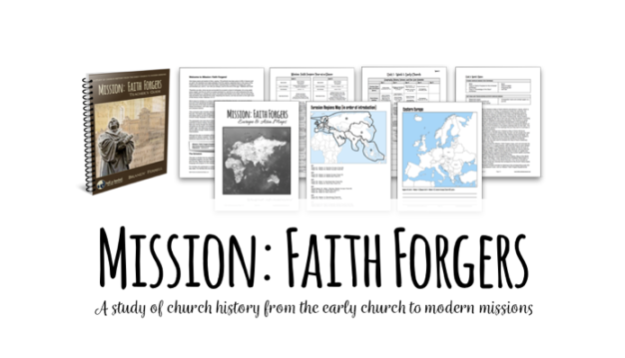
Teach us to number our days, that we may gain a heart of wisdom. Psalm 90:12, NIV
Through experience, I’ve come to approach this time of year with caution. While part of numbering our days aright is planning well, part of numbering our days aright is letting go of those plans when God has something else in store for our family.
So before we get started here, we acknowledge that the January and February winter months possess great potential for disrupting the ideal. This time of year (or any time of year), it’s okay to rethink goals. It’s okay to set aside curriculum. It’s okay to slow the pace. It’s okay to take time to enjoy family. It’s not just okay, it’s necessary.
Homeschooling is about relationships, not curriculum. It’s about our relationship with God, our relationship with each other, and our relationship to the world around us. If we seek first the kingdom of God, all of the other things will fall into place.
With that in mind, we share our homeschool plans for the spring semester.
Our Read Aloud Selections for Second Semester:
We’ll start with our favorite: sharing stories together as a family! We usually read a book together in the evenings the hour before we go to bed. These read-alouds are part of our Mission: Faith Forgers study. This collection of biographies provides a glimpse of how God has used willing vessels to extend love and compassion through a dark time in world history.
George Müller: The Guardian of Bristol’s Orphans. George Muller opened his life up to caring for the orphans of Bristol during the Industrial Age. Amazing story of faith in action!
Eric Liddell: Something Greater Than Gold. Known for standing on his convictions to honor God during the 1924 Summer Olympics, athlete Eric Liddell later devoted himself to sharing the Gospel as a missionary to China, serving in a Japanese internment camp during World War II.
Corrie ten Boom: Keeper of the Angels’ Den. During a time of great darkness, the ten Boom family risked their lives as they extended compassion to those under intense persecution during World War II. This true story of bravery, faith, and forgiveness remains a strong testimony of God’s power and grace.
Gladys Aylward: The Adventure of a Lifetime. One of the most amazing adventures of faith and endurance, Gladys Aylward’s story shows a life lived in trust and devotion to God as she ventures through communist Russia to follow God’s call to minister to the Chinese through World War II and beyond.
Richard Wurmbrand: Love Your Enemies. Founder of Voice of the Martyrs, former atheist Richard Wurmbrand accepted Christ and His call to serve Him as a pastor in Romania as World War II gave way to Communism. Wurmbrand endured years of torture in prison for preaching the Gospel, yet responded with love towards his captors.
God’s Smuggler (Young Reader’s Edition). Riveting, powerful, and thought-provoking, Brother Andrew’s autobiography recounts his journey of faith as he smuggled Bibles into countries behind the Iron Curtain. This edition has been written for a younger audience and is a great read aloud for younger children. (We also highly recommend the original version for both teens and adults! It will give you much to think about and discuss!)
Schedules
We usually read our read-alouds in the evenings after supper. We also have a Morning Time consisting of short readings and/or activities we’d like to do to jumpstart our school day. (Our Morning Time is Mission: Faith Forgers.) Our schedule looks a bit like this on an ideal day:

(Note: The “Before Breakfast” routine is a reminder for me, since our boys usually play basketball or have some other physical activity after lunch. And… I’ve placed times on this schedule to better show the passage of time, but our school day usually does not start until around 8:30 am.)
Rest assured that a schedule looks more orderly on paper than it does in real life! Usually I’m juggling four different students studying four different subjects. By the end of the day, though, each child has completed all of his daily assignments. It helps that each student knows what the schedule is supposed to be, and they all work fairly well off of that checklist. Here’s a more simplistic format of what our core, bare-bones schedule sort of looks like (but Block 1 consists of our Mission Faith Forgers Morning Time instead of just Memory work and maps).

Usually, one child is working on math while I’m working with another on language arts. If I’m working with a brother, they know to work through their assignments and simply highlight/circle anything with which they need my help. That’s why a checklist/schedule is so helpful for all of us. I have one printed for each one of them!
Morning Time – Mission Faith Forgers
Our morning time consists of Bible/devotion, hymn study, geography, science, history, composer study, and art projects. (See the Morning Time section in the first schedule above.) Not every morning includes all of these subjects but they’re scheduled/paced out in a simple format in the Mission: Faith Forgers Reading Plan.
 Morning time usually takes us about 30-45 minutes to complete, unless an art project or science experiment is scheduled. I provided some photos of science and art projects we completed last semester at our sneak peek into our homeschool! The general plan for the remainder of the year is…
Morning time usually takes us about 30-45 minutes to complete, unless an art project or science experiment is scheduled. I provided some photos of science and art projects we completed last semester at our sneak peek into our homeschool! The general plan for the remainder of the year is…
Bible. We begin our days with reading the Bible each morning and discussing as a family. This year, our Bible readings and devotions are related to world missions. This semester, we’ll be memorizing Matthew 6:9-13, Psalm 23, Matthew 5:3-9, and 1 Corinthian 13:4-13 using Bible Readeez.
Hymn Study. We’re studying hymns that are correlated with the missionary or historical context using the book Then Sings My Soul.
Science. This semester, we’ll be using God’s Design for Physical Science: Machines & Motion for a simple study of mechanical forces, simple machines, kinematics, dynamics, motion, and machines throughout history.
Geography. We’ll continue memorizing all of the countries of Europe and Asia, along with some of the Eurasian continent’s physical features. Resources include Window on the World, the Usborne Geography Encyclopedia, Children’s Atlas of God’s World, and Geography Songs.
Art & Music. We’ll continue with our missions-correlated art projects using art study and instructions from the Mission Faith Forgers Guide. We’ll also continue with our study of composers and orchestra using A Child’s Introduction to the Orchestra (formerly titled Story of the Orchestra). This semester, we’ll be introducing Brahms and Mahler while also learning about the percussion section, and we’ll review Wagner and Tchaikovsky along with the other sections of the orchestra that we covered last semester.
History. We finished Story of the World Volume 3 last semester, so we’ll be continuing with Story of the World Volume 4 this semester.
Can you believe all of that usually takes less than 40 minutes daily? The only exception is when we have an occasional art project, nature walk, or one of the longer science activities, but we usually postpone those to the afternoon. Download a sample of Mission Faith Forgers here and read reviews on our Testimonials page.
You can start this curriculum mid-year! Visit this post to find out how!
Mid-Year Curriculum Update
I haven’t had a chance to put together a mid-year reality check, but here’s the lowdown on what we’re using this semester beyond Mission: Faith Forgers.
Kindergartner
At this age, we go at a pace that fits the student, allowing ample time for play. We aim to keep our schedule and curriculum choices limited to reading, writing, and arithmetic until about 2nd or 3rd grade. (Starting in 1st grade, writing includes spelling and English grammar.) Aside from the following, he’s coloring, drawing, and listening to us read bunches and bunches of books!
- Reading: All About Reading Level 1. Read more about this program here.
- Writing: Script-n-Scribe Roller Coaster Writer
- Arithmetic: Learn numbers, counting, single-digit addition, measurement, and telling time. Learn to write numerals with Roller Coaster Writer.
5th Grader
- Personal Bible Study: Gospel Story Bible (10 minutes)
- Penmanship & Poetry: Script-n-Scribe Hymns in History, which includes artist/art study, poetry, and a gentle introduction/review of English grammar concepts – and it connects to hymns and historical highlights we’re studying in Mission: Faith Forgers! (5-10 minutes)
- Math: Saxon 7/6 at half-pace (one lesson every two days). (30-45 minutes)
- Language arts:
- English Grammar: Fix-It Grammar Level 2. (15 minutes) My older children didn’t have enough structured practice with editing and checking mechanics. IEW’s Fix-It Grammar program includes short simple lessons that reinforce application of parts of speech, usage, punctuation, capitalization, and more.
- Spelling: Spell to Write and Read (SWR) with some lists and dictation exercises from All About Spelling. (15 minutes)
- Exposition & Composition: IEW Fables, Myths, and Fairy Tales. (Introduces the same structures & styles as history based writing lessons but is more appropriate for children in Grades 3-5). (60 minutes)
- Latin: Visual Latin is great! Our 5th grader is just watching the Visual Latin 1 videos, and he’ll repeat it next year, completing the lesson pages and quizzes. (20 minutes)
- Other: Poetry review/memorization for 5-10 minutes. Independent reading for at least 30 minutes from assigned literature or student’s choice.
8th Grader
- Personal Bible Study: Gospels, Acts, Romans. Additional reference: What the Bible Is All About
- Math: Principles of Mathematics II from Master Books. This middle school pre-algebra program has been a Godsend for our second son!
- Exposition & Composition: Because he felt the need to return to formal essay and inventive writing using IEW’s Teaching Writing Structure and Style, we’re using IEW Modern World History-Based Writing Lessons, which fits in well with our Mission: Faith Forgers curriculum. He’s also reviewing a grammar concept each week using Grammar for Writers, a video course taught by the author of one of his favorite book series, the Wilderking Trilogy. To provide an overview of rhetorical devices, we’ll follow this up with Grammar of Poetry for the final 12 weeks of the school year.
- Latin: Visual Latin 1. Download 2 free lessons here and read a detailed review of this program here. Also download this Free Visual Latin & Henle Teaching Guide if you’re using Henle First Year Latin.
- Science: Exploring Creation with General Science 2nd Edition has been fantastic! It started with a history of science and an introduction to the scientific method along with how to analyze experiments and fstudies and experiments in origins and earth science. This semester, he’ll continue with applied science (energy & motion) and life science. The cover of this book looks dull, and the layout of the text does not include a large number of illustrations, but we’re impressed with the content! The experiments are fascinating and, although not visually appealing overall, the layout provides an opportunity to become familiar with high school level science textbooks. And… most of the experiments use common household items! (We also have a copy of 3rd edition, but he hasn’t wanted to switch to the new edition.)
- Logic: Finish up Introductory Logic: Fundamentals of Thinking Well and proceed with select parts of Intermediate Logic. The updated DVDs have been extremely helpful! Check out a sample of the new videos at this link. (Intermediate Logic is also available.) Read more about our experience with this program here.
- Spelling: Spelling Workout Level E with some lists and dictation exercises from All About Spelling. (This has been a nice balance as we continue to work on improving his spelling.)
11th Grader
- Personal Bible Study: New Testament Epistles
- History: Dave Raymond’s American History and Modernity. (Each course is one credit of history for high school. Because our 11th grader loves history, he has opted to take two history courses this year. American history is his core history credit, for which he has already obtained CLEP credit. He will complete Modernity as an audit course and aims to follow it up with taking another CLEP test. Download 2 free lessons: American History | Modernity (World History))
- Science: Exploring Creation with Biology.
- Math: Jacob’s Geometry
- Exposition & Composition: IEW Advanced U.S. History Based Writing Lessons. His remaining assigned literature for these two programs are:
- Adventures of Huckleberry Finn
- The Great Gatsby
- The Boy on the Wooden Box
- To Kill a Mockingbird (a repeat)
- The Old Man and the Sea (a repeat)
- The Chosen (Dad’s choice)
- *Other titles will be chosen from a list of American literature we’ve given him
- Latin: Visual Latin 1 & 2 along with reading Lingua Latina, a book written entirely in Latin.
- Extracurricular: Drama, Choir, and Advanced Art. He has also requested to work through the fabulous Architects of the Ancient World art course from Yellow Spot Sun.
On paper, it may seem nearly impossible. In real life, even our oldest son is usually done by 3pm. In fact, I’m continually amazed at how wonderful homeschooling has become for us as we seek first the kingdom of God! (To God be the glory!)
So… as we head into a new semester remember that “God is faithful, more than capable to be faithful to the end – and finish what he started.” – MercyMe
If you ever have questions or want to bounce ideas off another homeschool family, just give us a shout! We’d love to hear from you!






